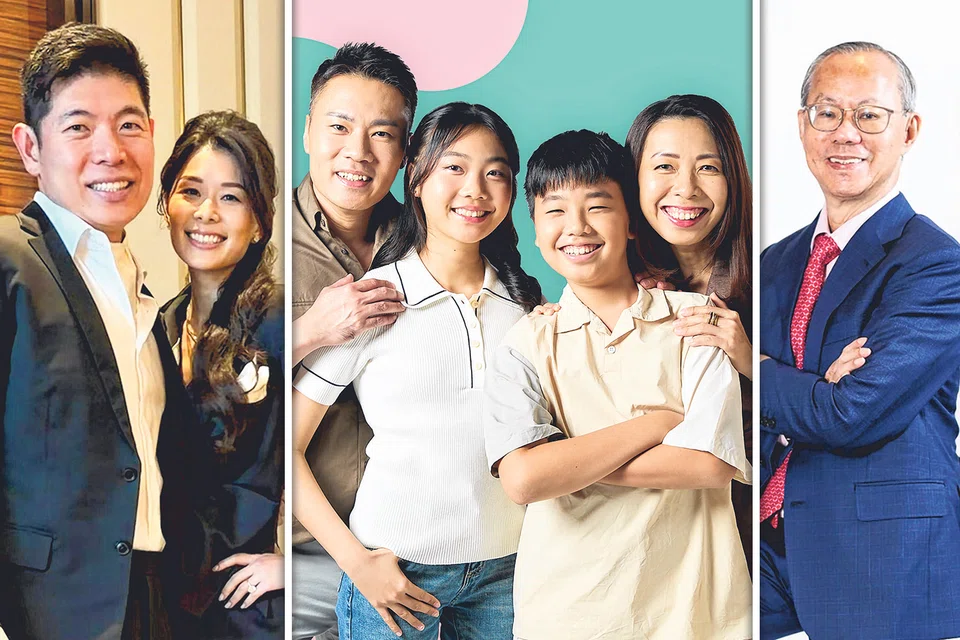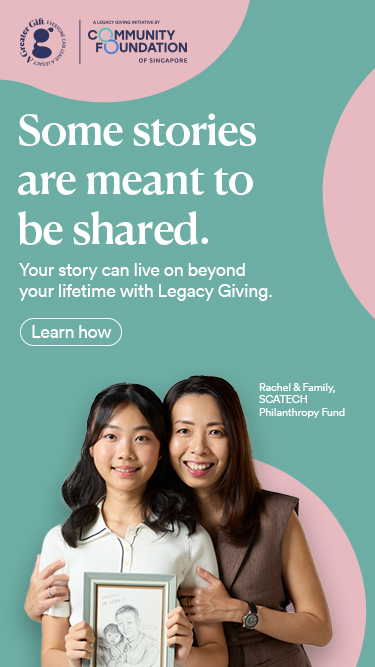“最后一桶金”规划新现象 别让财富添乱使尽不留遗产


这些年来越来越多人把部分遗产捐给慈善,甚至出现鼓吹“现在就花掉孩子遗产”的SKIN(Spend Your Kids’ Inheritance Now的缩略语)“使尽”现象。
世界首富之一比尔·盖茨多次承诺,把1130亿美元(约1595亿新元)财产几乎全捐给慈善,三个孩子各获1000万美元;他坚信留大笔钱给孩子绝对不是好事。
沃伦·巴菲特则宣布,一分也不留给三个孩子,会捐出所有给慈善。
本期《实况报道》请擅长信托和遗产事务的律师、法学教授和老年学学者谈SKIN“使尽”现象,并访问退休人士,了解不准备留太多给孩子的原因。
“不要留太多给孩子”的趋势渐长,有越来越多找律师办理遗嘱或信托事务的人,把部分遗产捐给慈善,或自设信托,以便更好地管理所支持的慈善事业。
两名擅长处理信托和遗产事务的资深律师告诉《联合早报》,积极行善的客户越来越多,一些甚至已定期捐钱给慈善机构,而不是等到过世后才这么做。
王律师事务所(WongPartnership LLP)专业人士及私人客户争议业务组负责人沈木英律师说,不论是用在自己身上、当礼物送给孩子或至爱,或是捐给慈善机构,财富在一个人还活着时是最有价值的。
“有的施予者享受从金钱得到的快乐,比如孩子或慈善机构向他表达感激之情,或通过捐钱做了好事而乐在其中。
“从这个角度,我可以明白为何一些人想在有生之年花光一切。”
她就见过一分钱也不给孩子的父母,有的因为跟孩子的关系恶劣,有的则因孩子挥金如土。相反的,也有继承遗产者积极行善,打算捐出大部分遗产。
福鼎律师事务所(Fortis Law Corporation)创办人陈子佳律师说,把遗产留给孩子是根深蒂固的传统价值观,但“花光”个人财产的做法也有益处。
他指出,父母留遗产给孩子理由很多,比如,在孩子成长期间常“缺席”,所以用遗赠示爱或表达愧疚。
有的因孩子是特需者,就用遗产设立信托,让孩子在他们离世后生活有照应。
“不论什么原因,孩子可能真的需要帮助,而留遗产给孩子的做法本身就能教导孩子施予的价值。”
沈木英说,虽然有客户认为孩子有一半的可能性会乱花遗产,但也有客户认为给孩子一笔钱,将有助于孩子取得成功。
设立慈善基金更好掌控财富
她指出,多数客户“守住”财富,是为孩子所需。一旦满足了孩子的需求,他们便会开始捐出行善。
不过,她留意到捐献者更有主动权,“与其直接捐钱给慈善机构,更多客户设立自己的慈善基金,以便更好掌控”。
她的一个客户选择帮某慈善机构设立医疗设施,再给予资助,而不是直接捐钱。
一些则每年把资产或生意赚取的部分收入捐给慈善,另一些把部分资产纳入慈善信托或基金,为慈善机构创造收入。
“还有一些给每个孩子一份财产,也给一份做慈善。也有客户设条件,要孩子先捐出所得遗产的10%,才能继承剩余的90%。”
沈木英指出,微软创办人比尔·盖茨累积的财富是子孙享用不尽的,所以设立慈善基金。但一般打工族以养家育儿为己任,慈善可能不是第一选项。
“事实是,越没钱的人,越要孩子过得比他们好,所以想方设法留下资产,但我认为帮孩子,不该凌驾于自己的需求和生活享受之上。”
陈子佳也认为,必须在SKIN和留遗产之间,取得平衡。
“我已立好遗嘱,也制定了持久授权书(LPA)。我确保自己有足够资源办好三件事:应付医药和退休开销,以及清还所有贷款和债务。”
孩子主动要求不要遗产
这些年来,陈子佳看到不少客户定期捐钱给慈善机构,有的甚至把遗产全捐给慈善。有些是因为他们的孩子能自给自足、明理和善良,叫父母留给较不幸者。
“我看到许多孩子,坚持父母不要列他们为受益人,把遗产转给有需要者或其他家庭成员,我就是其中一个。”
陈子佳坦言,他叫母亲把遗产留给兄弟姐妹、侄甥和慈善,“我希望以后我的孩子,也叫我不要列他们为遗产受益人”。
他感激父亲给他最好的教育:“做人要舍得。大舍大得,小舍小得,不舍不得。”
个案① :防子女争财产 卖掉大洋房
为了避免留下房子惹“后患”,七旬退休专业人士数年前毅然卖掉住了几十年的大洋房,搬到市区公寓,口袋满满地与老伴安享晚年。
问有三个子女的林大悟(化名),这样做难道不心痛不可惜?难道没想过把洋房留给其中一个孩子?
他语重心长说道,屋子太旧了,修理或重建都得花钱,租出去的话,租户不一定会爱惜房子,有问题也会来烦你。
“留的话,留给哪一个孩子?大家一定有不同意见。继承的人也未必喜欢屋子和地点,还是卖了干脆。我虽然知道房价以后会涨,但留下也有后患,除非你只有一个孩子。”
林大悟说,把财富传给下一代的传统观念是时候该调整了,但也不是改变一切,一分钱都不给儿孙。
他认为,给孩子的最佳礼物就是按他们的能力,让他们接受最好的教育,在有生之年尽可能帮助孩子,使他们可以自立、自组家庭,过安定的日子。
“给他们过多遗产,他们不会知道那些是你一辈子省吃俭用积攒而来的。钱到了他们手上变成零用钱,一下子就花光了,有时还嫌不够。”
“老年人必须确保能经济自立。钱在你口袋,总比在别人口袋好。你的辛苦钱一天不用,不花在自己身上,都还不是你的。但这么说也不是鼓励你挥霍乱花。”
他也说,儿女在事业和家庭起步阶段都须要帮助,但每个的情况不同,不要顾虑分配公平与否。
“最好孩子不需要你帮太久。他们有本事的话,其实不需要你,没本事,你即使有大把钱,也会惹争端。”
他感叹,有的父母尚在,手足之间就为了争夺资产而闹上公堂。“沒教好啊。父母尚未去世已经如此,不敢想象两老不在后,会搞出什么乱象。”
他眼看一些已故名人的孩子对簿公堂,“家家有本难念的经啊!身居高位的他们已是如此,平民百姓如我更不用说了。”
他指出,自己的孩子即使多好多孝顺,他们的伴侶却是未知数,“许多纷争都由此而起,因为他们对你这个长辈以及其他家庭成员的感情不同,到头来是利字当道。”
林大悟已立了遗嘱并制订LPA。“遗嘱和LPA直接了当,我俩其中一个有事,动产与不动产全交给还在的那一个,不会牵涉下一代。”
他说:“新加坡应该有中高档次、包伙食和提供医疗等服务的退休村,让付得起的老人有私人的服务式住所。”
林大悟的许多海外老年朋友就是这样卖了大房子,把钱用在退休村,有尊严地享受剩余岁月。
林大悟最后再三提醒,每个家庭的情况都不同,关键是老年人要有经济自由。
“不要太早分家产,也不要让他们知道将得到什么。如果孩子一直要钱,不断争吵,就索性捐给可以信任的慈善机构。”
个案② :多年沟通与磨合 父母终于安心“花钱”享乐
多年打拼后累积可观财富,年长父母想为儿女规划财产安排未来,但儿女更希望父母专注当下享受生活。两代人为彼此着想却一度引起不愉快,但如今达成共识,老两口放心“花钱”,晚年活出精彩和意义。
陈丽丝(化名,29岁,项目经理)的父母40多年前顶下红山一家小店铺,从小买卖一步步发展。随着公司规模越来越大,陈家的经济条件越来越好,21年前搬入了荷兰村一带的独立式洋房。
“父母特别疼爱我们四个孩子,花钱毫不吝啬。但我们从小目睹父母打拼的精神,也立志像他们一样,努力自力更生。”
陈丽丝说,大哥10年前结婚时打头阵,对想要为新人买房的父母说,以后都不会拿爸妈的钱。兄妹四人借机向父母提出,希望他们能够提早退休,去享受晚年生活。
“记得当时父母的反应很激烈,还问是不是觉得他们老了没能力赚钱养家,让我们哭笑不得。”
对陈丽丝和哥哥来说,父母从小的疼爱、付出和栽培才是最宝贵的财富,再多的遗产也不及看到父母在有生之年开心重要。
经过多年的沟通和磨合,如今年近70的父母终于完全理解儿女的立场,也就遗产事宜达成了共识。
父母在疫情暴发时退休,积极投身义工和慈善。随着边境开放,两人开始出国旅行,尝试年轻时没能享受的体验。
“我们告诉父母,他们最好把所有的钱都花完,不留任何遗憾。他们看到我们事业和生活都有足够保障,也就放心让我们自理。”
妥善安排遗产 儿女父母须坦诚沟通
老年学和信托专家认为,遗产或许不是越多越好,但究竟多少才“合适”、剩余的如何安排,还须要父母和儿女坦诚开放的沟通。
新加坡管理大学法学院教授陈汉吾说,多数新加坡人都要留遗产给孩子,希望子孙过得比上一代好。《回教法执行法令》就规定三分之二遗产须留给包括孩子的受益人。
针对SKIN的趋势,他认为,老练、超高净值者认为,留太多钱给孩子不是祝福而是祸害,“要达到目标努力奋斗,太多钱反而成了障碍,也会一直怀疑人们接近他们是为了钱”。
新加坡新跃社科大学副教授(老年学课程)和体验式教育中心高级专家马学嘉博士说,多数普通收入的家长担心留给孩子太少,因此可能省吃俭用,努力存钱给孩子,给他们带来更多金钱保障。
不过,遗产积累越多,越影响父母的生活质量。
她解释,这种心态和行为源自传统的集体主义(collectivism)价值观。不论是几十人的大家庭或是仅有四五人的核心家庭,成员之间都会考虑共同利益,必要时更是准备牺牲自我利益。
随着我国社会的变迁,家庭结构有所改变,有年轻一代选择单身,即使结婚,也可能计划只养“毛孩”(意宠物)、不要儿女。他们的日常开销因此可能更少,不大需要额外的金钱贴补生活。
马学嘉说,与其父母省吃俭用、拮据度日,相信孩子更乐意看到他们安享晚年,“父母和孩子两代人的观念不同,须要坦诚开放地沟通”。
生老病死是人之常情,但人们或因恐惧而忌讳讨论,孩子该如何开口与父母讨论遗产事宜?
马学嘉强调,每个家庭有个别的相处模式,但最重要的是以父母的意愿为中心。
她分享自己做义工的经验说,一些老人家对立遗嘱所需的程序和考量不了解,儿女就说教似地告诉父母该怎么做,附加自己对遗产的设想和要求,没考虑父母想要怎么安排。
“作为儿女,我们应该帮助父母了解过程,并尊重他们的意愿,在需要时帮助他们完成。”
陈汉吾是新加坡社区基金会(The Community Foundation of Singapore)捐献者指示委员会(Donor Advised Committee)成员,也为本地慈善组织提供咨询。
他说,一些富人觉得生活在危机重重、极度不平等的世界,所以希望捐一些遗产,改善贫困甚至气候问题。
“年轻一代对留遗产给慈善事业相当正面。这一代非常热衷于一些事项,例如气候改变。”
但陈汉吾认为,为慈善捐赠财产不仅是有钱人的专利。儿女如果有一定能力,以父母的名义给学校或大学捐钱设立奖项,也很有意义。“用大概5万元设个奖项,可以纪念死者多年。”
他指出,早前的殖民时期,英国政府没提供足够的社会服务,只能靠社群自发提供援助。
本地著名的华人慈善家就有陈笃生、陈嘉庚、陈六使和李光前,陈汉吾说:“从殖民时期,慈善早就成为新加坡DNA的一部分。”
信用:联合早报©新报业媒体有限公司。复制需要许可
This article was originally published in Zaobao here. Source: Zaobao © SPH Media Limited. Permission required for reproduction.
这些年来越来越多人把部分遗产捐给慈善,甚至出现鼓吹“现在就花掉孩子遗产”的SKIN(Spend Your Kids’ Inheritance Now的缩略语)“使尽”现象。
世界首富之一比尔·盖茨多次承诺,把1130亿美元(约1595亿新元)财产几乎全捐给慈善,三个孩子各获1000万美元;他坚信留大笔钱给孩子绝对不是好事。
沃伦·巴菲特则宣布,一分也不留给三个孩子,会捐出所有给慈善。
本期《实况报道》请擅长信托和遗产事务的律师、法学教授和老年学学者谈SKIN“使尽”现象,并访问退休人士,了解不准备留太多给孩子的原因。
“不要留太多给孩子”的趋势渐长,有越来越多找律师办理遗嘱或信托事务的人,把部分遗产捐给慈善,或自设信托,以便更好地管理所支持的慈善事业。
两名擅长处理信托和遗产事务的资深律师告诉《联合早报》,积极行善的客户越来越多,一些甚至已定期捐钱给慈善机构,而不是等到过世后才这么做。
王律师事务所(WongPartnership LLP)专业人士及私人客户争议业务组负责人沈木英律师说,不论是用在自己身上、当礼物送给孩子或至爱,或是捐给慈善机构,财富在一个人还活着时是最有价值的。
“有的施予者享受从金钱得到的快乐,比如孩子或慈善机构向他表达感激之情,或通过捐钱做了好事而乐在其中。
“从这个角度,我可以明白为何一些人想在有生之年花光一切。”
她就见过一分钱也不给孩子的父母,有的因为跟孩子的关系恶劣,有的则因孩子挥金如土。相反的,也有继承遗产者积极行善,打算捐出大部分遗产。
福鼎律师事务所(Fortis Law Corporation)创办人陈子佳律师说,把遗产留给孩子是根深蒂固的传统价值观,但“花光”个人财产的做法也有益处。
他指出,父母留遗产给孩子理由很多,比如,在孩子成长期间常“缺席”,所以用遗赠示爱或表达愧疚。
有的因孩子是特需者,就用遗产设立信托,让孩子在他们离世后生活有照应。
“不论什么原因,孩子可能真的需要帮助,而留遗产给孩子的做法本身就能教导孩子施予的价值。”
沈木英说,虽然有客户认为孩子有一半的可能性会乱花遗产,但也有客户认为给孩子一笔钱,将有助于孩子取得成功。
设立慈善基金更好掌控财富
她指出,多数客户“守住”财富,是为孩子所需。一旦满足了孩子的需求,他们便会开始捐出行善。
不过,她留意到捐献者更有主动权,“与其直接捐钱给慈善机构,更多客户设立自己的慈善基金,以便更好掌控”。
她的一个客户选择帮某慈善机构设立医疗设施,再给予资助,而不是直接捐钱。
一些则每年把资产或生意赚取的部分收入捐给慈善,另一些把部分资产纳入慈善信托或基金,为慈善机构创造收入。
“还有一些给每个孩子一份财产,也给一份做慈善。也有客户设条件,要孩子先捐出所得遗产的10%,才能继承剩余的90%。”
沈木英指出,微软创办人比尔·盖茨累积的财富是子孙享用不尽的,所以设立慈善基金。但一般打工族以养家育儿为己任,慈善可能不是第一选项。
“事实是,越没钱的人,越要孩子过得比他们好,所以想方设法留下资产,但我认为帮孩子,不该凌驾于自己的需求和生活享受之上。”
陈子佳也认为,必须在SKIN和留遗产之间,取得平衡。
“我已立好遗嘱,也制定了持久授权书(LPA)。我确保自己有足够资源办好三件事:应付医药和退休开销,以及清还所有贷款和债务。”
孩子主动要求不要遗产
这些年来,陈子佳看到不少客户定期捐钱给慈善机构,有的甚至把遗产全捐给慈善。有些是因为他们的孩子能自给自足、明理和善良,叫父母留给较不幸者。
“我看到许多孩子,坚持父母不要列他们为受益人,把遗产转给有需要者或其他家庭成员,我就是其中一个。”
陈子佳坦言,他叫母亲把遗产留给兄弟姐妹、侄甥和慈善,“我希望以后我的孩子,也叫我不要列他们为遗产受益人”。
他感激父亲给他最好的教育:“做人要舍得。大舍大得,小舍小得,不舍不得。”
个案① :防子女争财产 卖掉大洋房
为了避免留下房子惹“后患”,七旬退休专业人士数年前毅然卖掉住了几十年的大洋房,搬到市区公寓,口袋满满地与老伴安享晚年。
问有三个子女的林大悟(化名),这样做难道不心痛不可惜?难道没想过把洋房留给其中一个孩子?
他语重心长说道,屋子太旧了,修理或重建都得花钱,租出去的话,租户不一定会爱惜房子,有问题也会来烦你。
“留的话,留给哪一个孩子?大家一定有不同意见。继承的人也未必喜欢屋子和地点,还是卖了干脆。我虽然知道房价以后会涨,但留下也有后患,除非你只有一个孩子。”
林大悟说,把财富传给下一代的传统观念是时候该调整了,但也不是改变一切,一分钱都不给儿孙。
他认为,给孩子的最佳礼物就是按他们的能力,让他们接受最好的教育,在有生之年尽可能帮助孩子,使他们可以自立、自组家庭,过安定的日子。
“给他们过多遗产,他们不会知道那些是你一辈子省吃俭用积攒而来的。钱到了他们手上变成零用钱,一下子就花光了,有时还嫌不够。”
“老年人必须确保能经济自立。钱在你口袋,总比在别人口袋好。你的辛苦钱一天不用,不花在自己身上,都还不是你的。但这么说也不是鼓励你挥霍乱花。”
他也说,儿女在事业和家庭起步阶段都须要帮助,但每个的情况不同,不要顾虑分配公平与否。
“最好孩子不需要你帮太久。他们有本事的话,其实不需要你,没本事,你即使有大把钱,也会惹争端。”
他感叹,有的父母尚在,手足之间就为了争夺资产而闹上公堂。“沒教好啊。父母尚未去世已经如此,不敢想象两老不在后,会搞出什么乱象。”
他眼看一些已故名人的孩子对簿公堂,“家家有本难念的经啊!身居高位的他们已是如此,平民百姓如我更不用说了。”
他指出,自己的孩子即使多好多孝顺,他们的伴侶却是未知数,“许多纷争都由此而起,因为他们对你这个长辈以及其他家庭成员的感情不同,到头来是利字当道。”
林大悟已立了遗嘱并制订LPA。“遗嘱和LPA直接了当,我俩其中一个有事,动产与不动产全交给还在的那一个,不会牵涉下一代。”
他说:“新加坡应该有中高档次、包伙食和提供医疗等服务的退休村,让付得起的老人有私人的服务式住所。”
林大悟的许多海外老年朋友就是这样卖了大房子,把钱用在退休村,有尊严地享受剩余岁月。
林大悟最后再三提醒,每个家庭的情况都不同,关键是老年人要有经济自由。
“不要太早分家产,也不要让他们知道将得到什么。如果孩子一直要钱,不断争吵,就索性捐给可以信任的慈善机构。”
个案② :多年沟通与磨合 父母终于安心“花钱”享乐
多年打拼后累积可观财富,年长父母想为儿女规划财产安排未来,但儿女更希望父母专注当下享受生活。两代人为彼此着想却一度引起不愉快,但如今达成共识,老两口放心“花钱”,晚年活出精彩和意义。
陈丽丝(化名,29岁,项目经理)的父母40多年前顶下红山一家小店铺,从小买卖一步步发展。随着公司规模越来越大,陈家的经济条件越来越好,21年前搬入了荷兰村一带的独立式洋房。
“父母特别疼爱我们四个孩子,花钱毫不吝啬。但我们从小目睹父母打拼的精神,也立志像他们一样,努力自力更生。”
陈丽丝说,大哥10年前结婚时打头阵,对想要为新人买房的父母说,以后都不会拿爸妈的钱。兄妹四人借机向父母提出,希望他们能够提早退休,去享受晚年生活。
“记得当时父母的反应很激烈,还问是不是觉得他们老了没能力赚钱养家,让我们哭笑不得。”
对陈丽丝和哥哥来说,父母从小的疼爱、付出和栽培才是最宝贵的财富,再多的遗产也不及看到父母在有生之年开心重要。
经过多年的沟通和磨合,如今年近70的父母终于完全理解儿女的立场,也就遗产事宜达成了共识。
父母在疫情暴发时退休,积极投身义工和慈善。随着边境开放,两人开始出国旅行,尝试年轻时没能享受的体验。
“我们告诉父母,他们最好把所有的钱都花完,不留任何遗憾。他们看到我们事业和生活都有足够保障,也就放心让我们自理。”
妥善安排遗产 儿女父母须坦诚沟通
老年学和信托专家认为,遗产或许不是越多越好,但究竟多少才“合适”、剩余的如何安排,还须要父母和儿女坦诚开放的沟通。
新加坡管理大学法学院教授陈汉吾说,多数新加坡人都要留遗产给孩子,希望子孙过得比上一代好。《回教法执行法令》就规定三分之二遗产须留给包括孩子的受益人。
针对SKIN的趋势,他认为,老练、超高净值者认为,留太多钱给孩子不是祝福而是祸害,“要达到目标努力奋斗,太多钱反而成了障碍,也会一直怀疑人们接近他们是为了钱”。
新加坡新跃社科大学副教授(老年学课程)和体验式教育中心高级专家马学嘉博士说,多数普通收入的家长担心留给孩子太少,因此可能省吃俭用,努力存钱给孩子,给他们带来更多金钱保障。
不过,遗产积累越多,越影响父母的生活质量。
她解释,这种心态和行为源自传统的集体主义(collectivism)价值观。不论是几十人的大家庭或是仅有四五人的核心家庭,成员之间都会考虑共同利益,必要时更是准备牺牲自我利益。
随着我国社会的变迁,家庭结构有所改变,有年轻一代选择单身,即使结婚,也可能计划只养“毛孩”(意宠物)、不要儿女。他们的日常开销因此可能更少,不大需要额外的金钱贴补生活。
马学嘉说,与其父母省吃俭用、拮据度日,相信孩子更乐意看到他们安享晚年,“父母和孩子两代人的观念不同,须要坦诚开放地沟通”。
生老病死是人之常情,但人们或因恐惧而忌讳讨论,孩子该如何开口与父母讨论遗产事宜?
马学嘉强调,每个家庭有个别的相处模式,但最重要的是以父母的意愿为中心。
她分享自己做义工的经验说,一些老人家对立遗嘱所需的程序和考量不了解,儿女就说教似地告诉父母该怎么做,附加自己对遗产的设想和要求,没考虑父母想要怎么安排。
“作为儿女,我们应该帮助父母了解过程,并尊重他们的意愿,在需要时帮助他们完成。”
陈汉吾是新加坡社区基金会(The Community Foundation of Singapore)捐献者指示委员会(Donor Advised Committee)成员,也为本地慈善组织提供咨询。
他说,一些富人觉得生活在危机重重、极度不平等的世界,所以希望捐一些遗产,改善贫困甚至气候问题。
“年轻一代对留遗产给慈善事业相当正面。这一代非常热衷于一些事项,例如气候改变。”
但陈汉吾认为,为慈善捐赠财产不仅是有钱人的专利。儿女如果有一定能力,以父母的名义给学校或大学捐钱设立奖项,也很有意义。“用大概5万元设个奖项,可以纪念死者多年。”
他指出,早前的殖民时期,英国政府没提供足够的社会服务,只能靠社群自发提供援助。
本地著名的华人慈善家就有陈笃生、陈嘉庚、陈六使和李光前,陈汉吾说:“从殖民时期,慈善早就成为新加坡DNA的一部分。”
信用:联合早报©新报业媒体有限公司。复制需要许可
This article was originally published in Zaobao here. Source: Zaobao © SPH Media Limited. Permission required for reproduction.
- Related Topics For You: DONOR STORIES, NEWS



